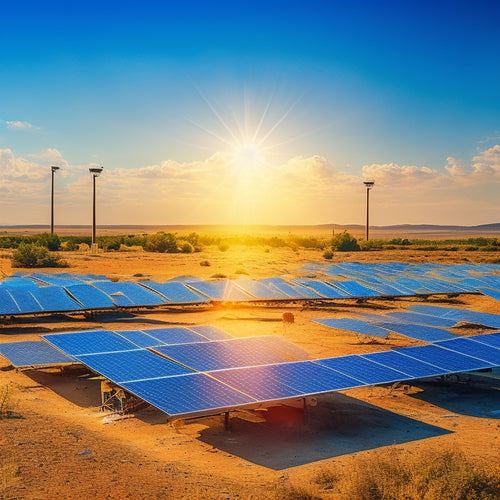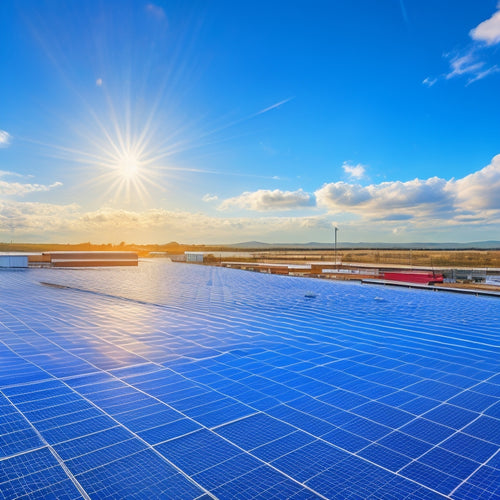
Solar With Battery Back Up
Share
You now have a solar panel system that can store excess energy generated during the day for use at night, thanks to the integration of a battery backup, providing you with a reliable and independent power source 24/7. This setup enables energy independence, reduces your reliance on the grid, and minimizes environmental impact. With a well-maintained battery, you'll have a consistent power supply overnight, eliminating the need for noisy generators. By understanding the importance of energy storage capacity, Depth of Discharge, and battery health monitoring, you'll be able to optimize your system's efficiency and reliability, and uncover even more benefits as you investigate the world of solar with battery backup.
The Essentials
- Solar with battery backup enables 24/7 energy independence, reducing reliance on the grid and minimizing environmental impact.
- Energy storage capacity and management are crucial, with proper design and selection ensuring system efficiency and reliability.
- Solar systems with battery backup significantly reduce carbon emissions, promoting a cleaner, greener future and environmental sustainability.
- Deep cycle battery technology and type selection are critical, with factors like cycle life and energy storage capacity influencing performance.
- Regular maintenance and monitoring are essential for optimal system performance, longevity, and reliability.
Energy Independence at Night
You've installed a solar panel system with battery backup, but what happens when the sun sets? You still need power, and that's where energy independence at night comes in.
With a battery-powered system, you can enjoy electricity after sunset, powering your home through the night. Furthermore, this setup allows you to reduce your reliance on the grid Power Grid Resiliency, thereby minimizing the environmental impact of traditional power consumption.
Additionally, by storing excess energy generated during the day, you can also alleviate the costs associated with peak-hour energy usage.
Power Through the Night
One of the primary concerns with traditional solar panel systems is their inability to provide power during the night, leaving homeowners reliant on the grid or diesel generators.
However, with solar with battery back up, you can break free from this limitation. By utilizing the power of the sun during the day and storing it in a battery, you can enjoy energy independence at night.
As you generate electricity through your solar panels, excess energy is stored in your battery. This stored energy is then used to power your home when the sun goes down.
This setup allows you to maximize your solar efficiency, guaranteeing you get the most out of your system. Furthermore, a well-maintained battery guarantees that you have a reliable source of power throughout the night.
With solar with battery back up, you're no longer bound to the grid or noisy generators. You have the freedom to power your home on your own terms, 24/7.
Electricity After Sunset
As the sun sets, your solar panels stop generating electricity, but your battery back up system takes over, providing a seamless supply of power to your home. This means you can continue to use your appliances, lights, and devices without interruption, enjoying the comfort and convenience of electricity after sunset.
With a solar installation and battery back up system, you're no longer reliant on the grid for nighttime usage. You've got a stored reserve of energy, generated during the day by your solar panels, which is then discharged as needed throughout the evening. This freedom from the grid is especially important for those who value energy independence.
When the sun dips below the horizon, your battery back up system takes over, providing a stable and reliable supply of power. This guarantees that your home remains lit, your fridge stays cool, and your devices stay charged, all without relying on the grid.
With a solar installation and battery back up system, you've got the power to live life on your own terms, without being held back by the limitations of traditional energy sources.
Reduced Carbon Footprint
You're likely drawn to solar with battery back up because you want to reduce your reliance on fossil fuels.
By utilizing the sun's energy, you'll be using a green energy source that greatly lowers your carbon footprint. With a lower emission output, you'll be contributing less to climate change and air pollution.
Additionally, residential solar power systems for homes can generate renewable energy and save on electricity bills with efficient and durable house solar panels renewable energy systems, making your home an eco-friendly haven.
Green Energy Source
Most households nowadays recognize the importance of reducing their carbon footprint, and solar energy with battery backup is an excellent way to achieve this goal. By utilizing the power of the sun, you can greatly decrease your reliance on fossil fuels and lower your carbon emissions.
As a renewable resource, solar energy is a sustainable solution that's available everywhere, making it an ideal choice for homeowners who want to reduce their environmental impact.
When you install a solar energy system with battery backup, you're not only generating clean energy but also storing excess energy for later use. This means you can power your home even during periods of low sunlight or at night.
With a battery backup system, you're no longer tied to the grid, giving you greater control over your energy usage and costs. By choosing solar energy with battery backup, you're investing in a green energy source that's not only good for the environment but also provides you with energy independence and savings.
Lower Emission Output
By integrating solar energy with battery backup into your home, you greatly reduce your reliance on fossil fuels, resulting in a substantial decrease in greenhouse gas emissions. This significant emission reduction contributes to a cleaner environment and a healthier planet.
With solar energy, you're no longer dependent on grid electricity, which is often generated by burning fossil fuels, a major contributor to climate change. By choosing solar with battery backup, you're adopting sustainability practices that not only benefit the environment but also enhance your energy independence.
The reduced carbon footprint from your solar-powered home is a significant step towards minimizing your impact on the environment. You'll produce clean energy during the day, store excess energy in your battery, and use it when needed, reducing your reliance on the grid.
This clean energy cycle leads to a substantial decrease in greenhouse gas emissions, making your home a more sustainable and environmentally friendly space. By embracing solar with battery backup, you're taking an essential step towards a cleaner, greener future, and enjoying the freedom that comes with energy independence.
Deep Cycle Battery Technology
When selecting a deep cycle battery for your solar with battery back up system, you'll want to evaluate two critical factors: battery cycle life and energy storage capacity.
As you investigate renewable energy solutions for reduced bills and off-grid power backup, it's crucial to choose a battery that aligns with your specific energy needs residential solar power.
Battery cycle life refers to the number of charge and discharge cycles a battery can handle before its capacity degrades.
Understanding these key performance metrics is vital for choosing the right battery for your specific energy needs.
Battery Cycle Life
A typical deep cycle battery, like those used in solar power systems with battery backup, can last for around 300 to 500 charge and discharge cycles. This lifespan is dependent on various factors, including your battery maintenance habits and charging efficiency.
You'll want to make certain that your batteries are charged correctly to prevent overcharging, which can reduce their lifespan. Proper charging efficiency is vital, as it helps maintain the battery's overall health.
You can extend the life of your deep cycle batteries by following a few simple guidelines. To begin with, avoid deep discharging, as this can cause significant wear and tear on the battery.
In addition, keep your batteries in a cool, dry place, away from extreme temperatures. Finally, perform regular checks on your batteries to identify any potential issues before they become major problems.
Energy Storage Capacity
Your deep cycle battery's energy storage capacity is a critical factor in determining how well your solar power system with battery backup can meet your energy needs. This capacity is measured in ampere-hours (Ah) and is a key factor in designing an effective energy management system. A higher energy storage capacity means you'll have more power available during periods of low solar production or at night.
When selecting a deep cycle battery, you'll want to take into account your energy requirements and the size of your solar array to guarantee seamless battery integration. A larger energy storage capacity also provides a buffer against unexpected power outages or changes in your energy usage patterns.
With a well-designed system, you can enjoy the freedom to use your energy as you see fit, without worrying about grid outages or peak hour restrictions. By optimizing your energy storage capacity, you'll be able to make the most of your solar power system and enjoy a more reliable, efficient, and independent energy supply.
Check Battery Depth Discharge
You need to monitor your battery's depth of discharge (DOD) to guarantee it's operating within a safe range.
For instance, when using residential battery storage solutions, it's essential to keep an eye on DOD to maximize the lifespan of your batteries.
If you consistently drain your batteries below 50%, you'll reduce their lifespan and overall health.
Depth of Discharge Matters
Frequently, solar installers and users overlook a critical aspect of battery backup systems: depth of discharge. You need to understand that depth of discharge (DOD) affects your battery's lifespan and discharge efficiency. DOD refers to the percentage of a battery's capacity that's used before it's recharged. A deeper DOD means you're using more of your battery's capacity, which can reduce its lifespan.
When you regularly discharge your battery to 80% or more, you're reducing its overall lifespan. This is because deep discharges cause more stress on the battery's cells, leading to premature wear.
On the other hand, keeping your DOD between 20% and 50% can help extend your battery's lifespan. Additionally, a shallower DOD can improve discharge efficiency, allowing you to get more usable energy from your battery.
To maximize your battery's performance and lifespan, it's important to monitor and control your DOD. You can do this by adjusting your energy usage habits, installing a battery management system, or using a smart inverter that optimizes your battery's charging and discharging cycles.
Battery Health Monitoring
Monitoring battery health is crucial to prolong its lifespan and prevent unexpected failures, especially when it comes to checking battery depth discharge.
You'll want to keep tabs on your battery's state of charge, voltage, and temperature to guarantee it's operating within ideal parameters.
This is where smart battery technology comes in – advanced monitoring systems that provide real-time data and alerts to help you stay on top of your battery's health.
More Efficient Power Storage
You're now looking to maximize your solar power system's efficiency by optimizing power storage.
To achieve this, you'll want to focus on enhanced energy capacity, which allows you to store more electricity during the day for use during the night or on cloudy days.
Enhanced Energy Capacity
Enhanced energy capacity is a critical component of solar with battery backup systems, as it directly impacts the reliability and efficiency of power storage. When you're looking to maximize your energy independence, you want to guarantee your system can store as much energy as possible. This is where advanced battery technologies come into play.
You'll find that different battery types, such as lithium-ion, lead-acid, and flow batteries, offer varying levels of energy capacity. When selecting a battery type, consider factors like charging efficiency, depth of discharge, and cycle life.
For instance, lithium-ion batteries boast high charging efficiency and a long cycle life, making them an attractive option for solar with battery backup systems. On the other hand, lead-acid batteries may require more maintenance but offer a lower upfront cost.
Frequently Asked Questions
Can I Charge My Electric Vehicle With a Solar With Battery Back up System?
You can charge your electric vehicle, but consider the charging efficiency; with a solar with battery back up system, you'll achieve grid independence, allowing you to fuel up freely, whenever you want, without relying on public charging stations.
How Long Does a Typical Solar With Battery Back up System Last?
As you reveal the secrets of renewable energy, you'll find that a typical system's lifespan can stretch up to 25 years, with battery longevity ranging from 10 to 15 years, depending on usage and maintenance, giving you a long-term key to energy independence.
Are Solar With Battery Back up Systems Suitable for Apartments?
When considering apartment living, you'll find that rooftop solar installations are often impractical due to installation challenges and limited space, making it difficult to reap cost benefits, but innovative solutions are emerging to overcome these obstacles.
Can I Use Any Type of Battery for Solar With Battery Back Up?
You're not stuck between a rock and a hard place when it comes to choosing batteries; however, not all battery types are created equal, and compatibility is key - you'll need to guarantee the one you pick is compatible with your system's requirements.
Do Solar With Battery Back up Systems Require Regular Maintenance?
You'll find that any battery-based system requires regular maintenance to guarantee peak system efficiency; the maintenance frequency will depend on factors like usage, environment, and battery type, so it's crucial to establish a routine to keep your system running freely.
Final Thoughts
As you bask in the freedom of energy independence, your solar with battery backup system silently works its magic. Like a loyal guardian, it watches over your home, storing excess energy during the day and releasing it when the sun dips below the horizon. With deep cycle battery technology, you can rest assured that your power storage is efficient and reliable. By embracing this innovative solution, you're not only reducing your carbon footprint but also illuminating a brighter, more sustainable future.
Related Posts
-

What Happens Without a Charge Controller in Solar Panels
Without a charge controller in your solar panel system, you risk overheating batteries due to overcharging, which can...
-

Commercial Solar Energy
As you consider powering your business with commercial solar energy, you'll uncover it offers a triple benefit: signi...
-

High-Efficiency Solar Battery Chargers for Remote Areas
High-efficiency solar battery chargers are essential for your off-grid energy needs in remote areas. They maximize en...


